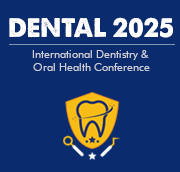Title : The concentration of enamel proteases in childrens with MIH in comparison with healthy children
Abstract:
MIH (Molar Incisor Hypomineralization) is a growing worldwide burden. It affects 18% of the children aged 6-16 in Israel. The aetiology is obscure since the defect occurs during the first 2-3 years of life but the clinical expression can be observed after first molar erruption, age 6+. During the secretory stage of amelogenesis the ameloblasts start secreting large amounts of enamel matrix proteins. Several proteins are secreted: amelogenin (80-90% of the organic matter), ameloblastin (only 5%) and enamelin (3-5%). The enamel proteins are removed by two proteases: matrix metalloproteinase 20 (MMP20) and kallikrein 4 (KLK4). During 2018, concentration of MMP20 and KLK4 were determined from blood samples of 500 children aged 0-5 years. Four years latter a sample of 95 children were clinically examined for MIH/dmh signs on their deciduous or permanent molars. 35 children showed signs of MIH/dmh and the concentration of MMP20 and KLK4 were statistically analized in the children with Mih/dmh in comparison with children without signs of MIH/dmh. In children wigh MIH/dmh the concentration of of KLK4 were significantly lower (P value=0.02). The concentration of MMP20 was higher in the MIH/dmh group but without statistical significance. Enamelysin (MMP20) is the main enzyme expressed by the secretory stage ameloblasts and is responsible for cleavage of the matrix proteins and is also responsible for activation of KLK4. KLK4 is expressed during the transitional and maturation stages and is responsible for protein degradation. In the absence of KLK4 substantial retention of enamel proteins occurs in the enamel. It may be postulated that the retention of the enamel proteins in MIH/dmh teeth was caused by reduced concentration of KLK4.


